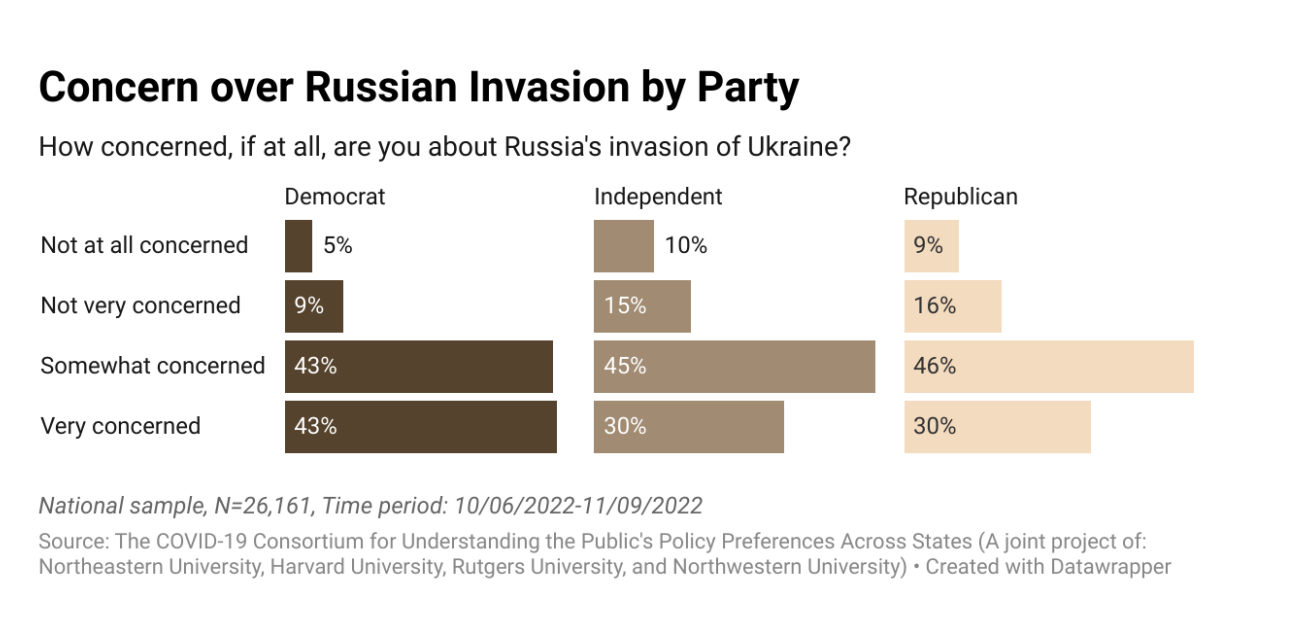Nearly 8 in 10 Americans Still Concerned About Russia’s Invasion of Ukraine
Survey results show that there is broad bipartisan support for an aggressive use of force if Russians use nuclear weapons
Get all our news
This shows that Americans are recognizing the potential threat of the war and are coming together in a rare bipartisan fashion in their worry about the Russian invasion.”
James Druckman
IPR political scientist

In March 2022, Ukrainians go to the Lviv railway station to escape the country after Russia's invasion.
As the war in Ukraine nears its one-year anniversary in February 2023, American news coverage of the conflict has dwindled.
Despite the drop in media attention, the majority of Americans, or nearly 8 in 10, say that they are still very concerned or somewhat concerned about Russia’s invasion of Ukraine, according to a national survey. Concern over the invasion was high across all political parties, with Democrats showing a higher level of concern (86%) compared to Republicans (76%) and independents (75%).

“This shows that Americans are recognizing the potential threat of the war and are coming together in a rare bipartisan fashion in their worry about the Russian invasion,” said IPR political scientist James Druckman, who co-authored the report.
Between October 6 and November 9, 2022, Druckman and a team of researchers from Harvard, Rutgers, and Northeastern universities surveyed 26,161 individuals across the country to gauge Americans’ attitudes towards the Russian invasion of Ukraine. The survey is part of the COVID States Project, which the researchers have been conducting since April 2020, examining Americans’ attitudes and behaviors around COVID-19.
Another key finding of the survey reveals that there is broad bipartisan agreement for an aggressive response if Russia were to use nuclear weapons, even if it meant direct American or NATO involvement.
In the event of a Russian nuclear attack, over half of those surveyed indicated support for tightening economic sanctions (62%), establishing a NATO-led no fly zone in Ukraine (56%), and increasing military aid to Ukraine (55%). Forty-two percent of Americans supported sending NATO troops into Ukraine to fight Russian forces occupying the country, compared to just 18% who opposed it. Very few (14%) of those surveyed reported they would support or strongly support withdrawing all military aid from Ukraine, while half indicated that they would oppose withdrawing military aid.
“These are interesting findings that show Americans are far from isolationists at least when it comes to global threats,” Druckman said.
Republicans and Democrats were equally likely to support launching missile strikes aimed at taking out nuclear weapons that Russia could use on the battlefield in Ukraine, with 4 in 10 Republicans and Democrats supporting these strikes. And while both parties supported increasing military aid to Ukraine in the event of a Russian nuclear attack, a larger group of Democrats (67%) support increasing military aid compared to Republicans (55%). Democrats (51%) were also more likely than Republicans (44%) to support sending NATO troops into Ukraine to fight Russian military.
Other key findings:
- Concern over the Russian invasion was high across all age groups, but significantly higher for older Americans, with 87% of those 65 or older reporting that they are concerned about the invasion.
- Women (82%) were more likely than men (75%) to report that they were more concerned about the invasion. The gender gap was largely driven by Republican and independent women.
- Americans with more education were slightly more concerned about the invasion. Eight in 10 individuals who had either been to college or had a college degree said they were concerned over the Russian invasion versus roughly 7 in 10 individuals whose highest level of education was some high school or a high school degree.
Read the report. Previous COVID States Project reports are available here.
James Druckman is the Payson S. Wild Professor of Political Science and IPR associate director and fellow.
Photo credit: iStock
Published: December 21, 2022.


